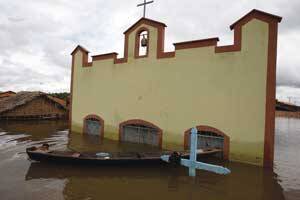A coalition of Catholic leaders and development agencies urged world leaders gathered in New York for a meeting on climate change to ease the burden environmental changes place on the planet’s poorest and most vulnerable people.
“I think climate change is another situation where the poor of the world are being made to suffer more and more because of the habits of the first world,” said Cardinal Keith O’Brien of St. Andrews and Edinburgh, Scotland, a member of a 15-person delegation that traveled to the U.N. headquarters for the meeting on Sept. 22. “[The poor] haven’t caused the problems,” he said, “and yet they’re paying for it.” Cardinal O’Brien cited U.N. estimates that between the years 2000 and 2004, climate-related disasters affected 262 million people.
The Catholic delegation was assembled by Cidse, a Belgium-based international alliance of leading Catholic development agencies, and Caritas Internationalis, a network representing 164 Catholic aid organizations around the world.
Another member of the Catholic delegation was Archbishop John Olorunfemi Onaiyekan of Abuja, Nigeria, former president of the Catholic Bishops’ Conference of Nigeria.
“I know from direct experience that a fair and effective climate deal is crucial to avoid further misery for southern communities,” Archbishop Onaiyekan said. Citing as an example the way residents of his country are adversely affected by climate change, he observed: “The process of desertification in the northern fringes of our country has made it impossible for cattle rearers to make a living in their traditional grazing grounds, forcing them to move elsewhere.”
“Developed countries must take the lead by making significant reductions in their greenhouse gas emissions and supporting developing countries in adapting to a changing climate and developing a low-carbon economy,” the archbishop concluded.
Convened by U.N. Secretary General Ban Ki-moon, the meeting on Sept. 22 was intended to build momentum for a major meeting on climate change to be held in Copenhagen, Denmark, from Dec. 7 to 18. The December meeting is viewed as pivotal to the campaign to reverse the causes of climate change, in large part because the Kyoto Protocol, which sets binding targets for 37 industrialized countries and the European Community for reducing greenhouse gas emissions, expires in 2012.
Observers stress that the delegates in Copenhagen must address four issues: 1) set meaningful emission-reduction targets for developed countries, 2) take steps to ease the effects of climate change on developing countries, 3) build financial and technological support to help countries adapt to and mitigate the impact of climate change and 4) develop an effective institutional framework that addresses the needs of developing countries.
Cardinal O’Brien spoke about the pressing need to address climate change at a Mass in New York on Sept. 20 in advance of the climate meeting.
Society “seems to have become immune to what is urgent,” the cardinal said. “When banks go bust, as they did in your country and mine last year, governments seem able to mobilize extraordinary energy and efforts as well as unconscionably large sums of money to bail them out,” the cardinal said. “This response stands in stark contrast to the ponderous efforts to address poverty and climate change.”
Quoting Martin Luther King Jr., the cardinal said: “Human progress is neither automatic nor inevitable. We are faced now with the fact that tomorrow is today. We are confronted with the fierce urgency of now.”








